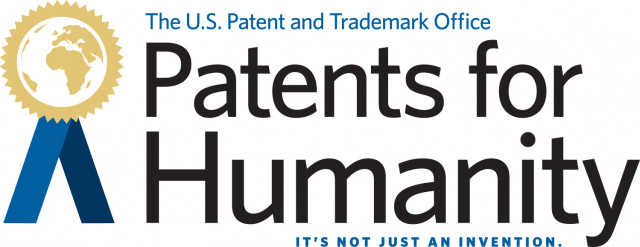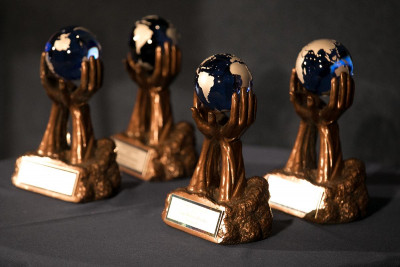The 2016 Patents for Humanity awards recognize four recipients and two honorable mentions, selected from the 2015 application pool.
Award Winners
U.S. Food & Drug Administration - for developing an improved meningitis vaccine production process that’s been used to immunize 235 million people in high-risk Africa countries.
Case Western Reserve University - for creating a low-cost, accurate malaria detection device using magnets and lasers that allows better diagnosis and treatment.
GestVision, Inc - for developing a quick, simple diagnostic test for preeclampsia, a potentially life threatening pregnancy complication, for use in developing regions.
Global Good Fund at Intellectual Ventures - for creating a passive cooler that can keep vaccines cold over 30 days and donating dozens of units to the fight against Ebola and other relief efforts.
Honorable Mentions
Alere Inc – for developing diagnostic assays for rapid and early HIV diagnosis at the point of care in low-resource settings.
- Sanofi – for researching new malaria drug candidates with shorter, simpler treatment regimens that can potentially counter the growing trend of drug resistance.
Read more about their stories below.
Award Winners
Category | Recipient |
|---|---|
Drugs & Vaccines | U.S. Food & Drug Administration
Meningitis A is a devastating disease afflicting 26 countries in Africa’s meningitis belt across sub-Saharan Africa. Thousands of people would die or be disabled each year, such as the 1996-97 epidemic when 25,000 were killed and a quarter million afflicted. The disease primarily afflicts young adults and children, leaving many wage earners with permanent brain damage. The Meningitis Vaccine Program (MVP) was formed by the health non-profit PATH, the Bill & Melinda Gates Foundation, and the World Health Organization to combat this epidemic.
Besides regulating the safety of food and health products, the U.S. Food & Drug Administration (FDA) also conducts research on human health issues. FDA scientists set out to create a better meningitis vaccine production method for the MVP. The new technology they came up with raised the vaccine production yield from 20% to 60% and enabled the vaccine to last up to four days without refrigeration, unlike previous vaccines. FDA licensed the technology to the MVP and hosted production scientists from MVP’s Indian manufacturer to teach them how to use the vaccine production technology. As a result, more than 235 million people in Africa’s meningitis belt have been immunized with MenAfriVac® since 2010. Only four cases of meningitis A were reported in 2013 in the immunized region covering 16 countries. In 2015, the World Health Organization (WHO) recommended that MenAfriVac® be introduced in routine immunization schedules in sub-Saharan Africa. This will ensure that infants are protected against meningitis and will maintain population-wide immunity. |
Medical Diagnostics | Case Western Reserve University
Accurately diagnosing malaria is a difficult problem, with an estimated half of global cases undiagnosed. The standard microscope test has low sensitivity with up to 30% false positives and 20% false negatives. This causes people infected with malaria to go untreated and people without malaria to receive anti-malarial drugs, contributing to drug resistance. Engineers and doctors at Case Western Reserve University (CWRU) designed a rapid, accurate, low-cost malaria diagnostic test to address this problem. The Magneto-Optical Detection (MOD) device uses lasers and magnets to diagnose malaria in a completely new way, by detecting iron-laden byproducts of the parasite in the blood. This provides results in minutes with just a finger prick blood sample. The device can be ten times cheaper per test than the current standard and can be run by ordinary caregivers with minimal training. CWRU has conducted field trials diagnosing malaria in the Amazon, India, and Kenya. Since receiving an honorable mention in the 2014 Patents for Humanity program, CWRU has begun working with manufacturers to produce the device at scale for wider user. |
Medical Diagnostics
| GestVision, Inc
Preeclampsia (PE) is a pregnancy complication that is the leading cause of prenatal death for mothers and babies worldwide, mostly in low and middle income countries. Although most deaths are preventable, approximately 63,000 women die from PE annually. In developed countries, PE can be diagnosed by regular doctor visits and laboratory tests, allowing treatment before severe symptoms if caught in time. However, in developing regions without regular prenatal care, PE is often undiagnosed until serious complications such as seizure, stroke or organ failure occur. Startup company GestVision has developed a rapid, affordable urine test caregivers can use to diagnose PE in low-resource settings. The test detects misfolded proteins in urine associated with PE, which may be shown by a colored dot similar to a pregnancy test. GestVision’s test kits are currently being used in clinical studies around the world, including Bangladesh, Mexico, and South Africa under a grant to The Research Institute at Nationwide Children's Hospital from Saving Lives at Birth, which is a collaboration of USAID, the Gates Foundation, and others to seek groundbreaking prevention and treatment approaches for pregnant women and newborns in poor, hard-to-reach communities. Following initial research at Yale University, GestVision was created to further develop the technology. GestVision is working on a manufacturing process to produce the kits in large volume. |
Medical Devices
| Global Good Fund at Intellectual Ventures
Delivering vaccines to off-grid regions is complicated by the need to keep them cold. The World Health Organization (WHO) estimates that 25-50% of global vaccines are wasted annually, much of this due to problems with maintaining a refrigeration “cold chain” during delivery. Researchers at Global Good designed the Arktek cooler to keep vaccines cold for over a month with no power required. The device combines an advanced design with high-efficiency insulation materials to prevent heat transfer.
The Global Good Fund managed by Intellectual Ventures is dedicated to inventing technology that improves lives in the developing world. They aim to develop sustainable commercialization models which ensure the technology is affordable, accessible, and appropriate for developing regions. Global Good donated 30 Arktek coolers to help the WHO deliver vaccines during the Ebola outbreak in 2014, and other units to Nepal to assist with vaccinations after the 2015 earthquake. They have also collaborated with the Clinton Health Access Initiative, PATH, the Gates Foundation, UNICEF, and other United Nations organizations to conduct field trials with over 50 devices in Ghana, Senegal, Ethiopia and Nigeria. Arktek has been used to store vaccines for tuberculosis, polio, and the pentavalent vaccines covering influenza, whooping cough, tetanus, hepatitis B, and diphtheria. The technology has been licensed to a leading refrigeration manufacturer to produce the device at scale for an affordable price. |
Honorable Mentions
Honorable mentions are awarded to outstanding projects with promising accomplishments. These projects remain eligible for an award in the future with further development.
| Category | Recipient |
|---|---|
Medical Diagnostics | Alere Inc for developing diagnostic assays for rapid and early HIV diagnosis at the point of care in in low-resource settings. |
Drugs & Vaccines | Sanofi for researching new malaria drug candidates with shorter, simpler treatment regimens that can potentially counter the growing trend of drug resistance. |
More Information
Previous recipients: 2015 awards and 2013 awards



